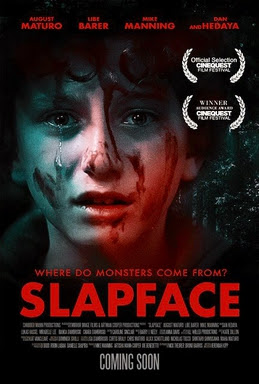Midnight
Writer & Director - Oh-Seung Kwon
Stars – Wi Ha-Joon, Park Hoon, Ki-joo Jin
2021, South Korea
A hearing-impaired daughter and mother get mixed up with
a devious serial killer. Well, it should be profoundly deaf, because the sound
design makes it clear they can’t hear a thing. This allows sound monitors of various
kinds all over the place (they must have spent all their money on them?) which aren’t
quite used inventively enough. However, the portrayal of Kyung Mi (Jun Ki-joo)
is mostly sympathetic although her hearing impairment is, of course, just a
conceit to rack up tension and misunderstanding. It’s no mistake that the
killer’s ability to talk himself out of situations is the counterpoint to her
desperation to be understood; he represents the constant threat of the verbose on
her impairment. Wi Ha-Joon makes for a handsome and slick killer
It pummels along, but it relies on everyone being a super-runner and the fumbling and stupidity of police and a little convenience-contrivance to keep things going. And going. Perhaps it’s twenty minutes too long because all the way through, the balance swings towards suspense and then rolling your eyes or shouting at characters (you may do this from the first scene) and it’s a little tiresome come the last act (No! Don’t turn your back on the killer! etc). There is a little of the debate about citizens responsibility to one another, a fine melee in a police station and a fine solution to stop him talking his way out all the time.
Faceless
Director - Marcel Sarmiento
Writers - Ed Dougherty, Marcel Sarmiento, Freddie
Villacci
2021, USA
Stars - Brendan Sexton III, Alex Essoe, Terry Serpico
A small time trouble-maker wakes up with someone's
else's face and a case of amnesia: uncovering the mystery ensues. Shadowy
alleys and bars and murkier medical experiments are all there. Sexton III puts
in a vulnerable performance as he experiences existential angst and identity
crises, trying to piece together what happened.
A film of face trauma and a plot that is both
conspiracy and film noir convolution. Uncomfortable throughout for the constant
face abuse, packed full of too many questions (Sarmiento says this himself, but
one shouldn’t fault a little over-ambition) but ultimately satisfying for the
body horror and plotting in a slightly confused and confusing noir manner.
We’re All Going to the World’s Fair
Writer & director - Jane Schoenbrun
2021, USA
Stars - Anna Cobb, Holly Anne Frink, Michael J Rogers
With another remarkable young performance from Anna
Cobb, this is something like ‘Eighth Grade’ and ‘Wild Tigers I Have Known’
for horror girls. Friendless video teen Casey (Cobb) plays The World’s
Fair, an internet horror game that is meant to possess you. The vibe is American
slacker suburbia - but more shoegaze ‘Wild Tigers’ than the metal of ‘Gummo’
– with the protagonist creating her own world online, although she may be
talking to no one. But then she is contacted by the dubious MJR, and afterwards
she becomes increasingly unstable.
The pace is slow and immersive, utilising long takes
and a modern teen’s ease with being on camera. Details like the colourful interior
of Casey’s room are vivid and diegetic sound of rain on the roof and traffic
passing becoming increasingly create unsettling ambience. It creates a
convincing depiction of experience through online videos (expect your screen to
buffer frequently) but, like ‘Eighth Grade’, it sides with the kids in
that they know exactly how to navigate the artificial and performative world
online. Empathetic and weirdly creepy as we seem to be watching a girl’s loneliness
turn to mental instability, it maintains its elusiveness to the very end. A
character study of teenage malaise and escapism.
The Free Fall
Director - Adam Stilwell
Writer - Kent Harper
Stars - Andrea Londo, Shawn Ashmore, Jane Badler
Slick but prosaic with obvious scares and gaslighting,
starts all Gothic ‘Rebecca’ before a touch of ‘The Shining’ and ‘The
Conjuring’ universe and ‘The Exorcist’. Possibly camp fun? It didn’t
strike me the way Grimmfest’s synopsis did as “a chilling commentary on the
seductiveness of Hollywood's dreams of dark romance.”
On the 3rd Day - Al Tercer Día
Director - Daniel de la Vega
Writers - Alberto Fasce, Gonzalo Ventura
2021, Argentina
Stars - Mariana Anghileri, Arturo Bonín, Diego
Cremonesi
Like de la Vega’s previous ‘The White Coffin’,
this too features a woman running around in the middle of something
supernatural with a child’s life at stake. The influences and homages to Seventies
films are evident (red and yellow raincoats, anyone?), but de la Vega makes the
somewhat choppy pacing and nightmare logic of giallo into a pell-mell ride
through tropes and mystery. There’s nothing you wouldn’t guess here, but de la
Vega’s style always feels like it can’t stop to be obvious, always throwing
into hints of something else that implies it could go off in any direction (the
silhouette of a man wielding a crowbar in front of a house is straight out of a
slasher, for example). This makes for a fun and artful ride through genre, heading
for a classic last image before the credits. But there’s also more after the scrapbook
credits.
Normally film stills in credits and post-credit codas aren’t something I like, but there is something “everything in!” about da la Vega’s style that I go even with this.

























